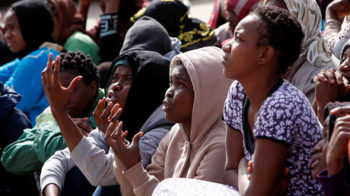
The United Nations urgently appealed Monday for countries to take in 1,300 “extremely vulnerable” refugees stranded in Libya, following revelations of horrific abuse of migrants in the country.
The UN refugee agency said there was a dire need for 1,300 resettlement places by the end of March 2018.
“This is a desperate call for solidarity and humanity,” Volker Turk, UNHCR’s Assistant High Commissioner for Protection, said in a statement.
“We need to get extremely vulnerable refugees out of Libya as soon as possible,” he said.
The chaos-ridden country has long been a major transit hub for migrants trying to reach Europe. Many refugees and migrants have fallen prey to serious abuse there at the hands of human traffickers and others.
European and African leaders have already vowed to evacuate nearly 4,000 distressed migrants from Libya after global outrage erupted last month over video footage showing African migrants being auctioned off as slaves in the country.
“Many refugees, asylum seekers and stateless persons in Libya are victims of serious violations of human rights, including different forms of inhumane, cruel and degrading treatment,” the UNHCR warned in Monday’s appeal.
It stressed that many of them had been detained for an indefinite period of time in deplorable conditions, denouncing the “routine detention of refugees and displaced people.”
The UN refugee agency in early November evacuated a first group of 25 vulnerable refugees — 15 women, six men and four children of Eritrean, Ethiopian and Sudanese nationalities — to Niger.
“Given the imminent humanitarian needs and the rapidly deteriorating conditions in detention centres in Libya, UNHCR is actively working to organise more life-saving refugee evacuations to Niger in the coming weeks and months,” Turk said.
UNHCR said the vulnerable refugees included unaccompanied children, single mothers, people with serious medical conditions and people who had been severely tortured during their journey or in detention in Libya.
The agency said it aimed to evacuate them to Niger and hopefully other emergency transit centres pending their final resettlement to other countries.
“Given the seriousness of the situation for refugees in Libya, we need to explore all sorts of solutions, including resettlement, family reunification, evacuation to UNHCR-run emergency facilities in other countries, or voluntary return,” Turk said.
Agency Report
